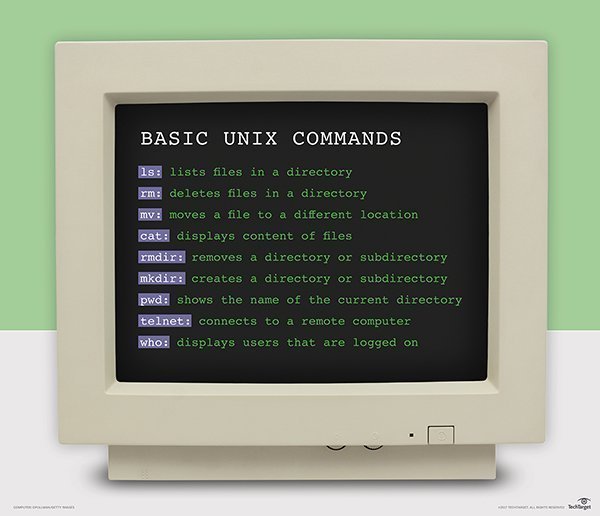Unix Definition
Unix — often spelled UNIX, especially as an official trademark — is a multi-user operating system designed for flexibility and adaptability. Originally developed in the 1970s, Unix was one of the first operating systems to be written in C language.
The history of Unix
In the late sixties, Bell Labs, the Massachusetts Institute of Technology and General Electric attempted to develop an interactive time-sharing system called Multics that would enable multiple users to simultaneously access a mainframe. Disappointed with the result, Bell Labs pulled out of the project.
But Bell computer scientists Ken Thompson and Dennis Ritchie decided to continue the work, which culminated in Unix’s development. Thompson and Ritchie led a team of Bell Labs researchers to develop a hierarchical file system, a command-line interpreter, some small utility programs, and the concepts of computer processes and device files.
A month later, Thompson had deployed a self-hosting operating system with an assembler, editor and shell. The name — pronounced YEW-nihks — was a pun based on the earlier system; an emasculated — or eunuch — version of Multics. Unix was much smaller than what the original developers intended for Multics and was a single-tasking system as opposed to a multitasking one.
Prior to 1973, Unix was written in assembler language, but the fourth edition of Unix was rewritten in C. This was revolutionary at the time because operating systems were thought to be too complex and sophisticated to be written in C, a high-level language. This increased Unix’s portability to other computing platforms.
In the late 1970s and early 80s, Unix had a strong influence in academia that led commercial startups, such as Solaris Technologies and Sequent, to adopt it on a larger scale. In the late 1990s, a network of programmers collaboratively developed Linux and Berkeley Software Distribution (BSD) distributions, which led Unix-like systems to grow in popularity. Today, a variety of modern servers, workstations and mobile devices use Unix operating systems.
How Unix works and why it’s important
Unix has a set of concepts that make it unique. For example, Unix uses plain text to store data. It also uses hierarchical file systems and treats devices and certain kinds of interprocess communication (IPC) as files.
The concepts of Unix are influential for a variety of reasons. Unix was a driving force behind the development of the internet and the transformation of computing to be network-centric. Unix treats all types of files as simple byte arrays, which presented a simplified file model compared to other operating systems.
Unix popularized the hierarchical file system with arbitrarily nested subdirectories; previously, operating systems could only divide a storage device into sections by a fixed number of levels. Unix developers are credited for bringing modularity and reusability into the practice of software engineering and inciting a software tools movement. They also created a set of cultural rules for software development, coined the Unix philosophy, that has been influential to the IT community.
Free and open source Unix-like systems
Unix has evolved as a kind of large freeware product, with many extensions and new ideas provided in a variety of versions of Unix by different companies, universities and individuals.
Unix became the first open or standard operating system that could be improved or enhanced by anyone, partly because it was not a proprietary operating system owned by any one of the leading computer companies, and partly because it was written in a standard language and embraced many popular ideas.
A composite of the C language and shell — user command — interfaces from different versions of Unix were standardized under the auspices of the IEEE as the Portable Operating System Interface (POSIX). In turn, the POSIX interfaces were specified in the X/Open Programming Guide 4.2. These interfaces are also known as the Single UNIX Specification and, in the most recent version, UNIX 03.
The trademarked UNIX is now owned by The Open Group, an industry standards organization that certifies and brands Unix implementations.
Unix-like systems
There is no clear definition of Unix-like, but the term refers to an operating system that behaves similarly to Unix. It can refer to the free and open source aspects of Unix.
Some software developers assert that there are three types of Unix-like systems. Genetic Unix-like systems have a historical connection to the original Bell Labs — later AT&T — codebase, such as BSD systems, which University of California, Berkeley researchers worked on in the late 70s and early 80s. Trademark and branded Unix-like systems meet the Single UNIX Specification; The Open Group has determined that these systems are allowed to use the Unix name. Functional Unix-like systems, such as Linux and Minix, behave in a manner that is approximately consistent with the Unix specification. For example, they must have a program that manages the login and command-line sessions.
Popular basic Unix commands

Uses and the future of Unix
Unix operating systems are used in widely sold workstation products from Sun Microsystems, SGI, IBM and a number of other companies. Linux, a Unix derivative available in both free software and commercial versions, is increasing in popularity as an alternative to proprietary operating systems.
Recently, Unix has seen a decline in usage, primarily due to the migration from RISCplatforms to x86-based alternatives that can run many Unix workloads with higher performance at a lower cost. Experts predict that many organizations will continue to use Unix for mission-critical environments, but will decrease their dependency on the system due to IT modernization and consolidation strategies.
However, Unix is still the preferred system for many use cases, such as vertical-specific software, vertical scaling applications and security features. Future Unix server sales are expected to drop, but applications in financial, government and telecommunications will continue to drive Unix use.
Eventually, Unix may be abandoned completely, but it will likely be a long, slow decline before that happens.